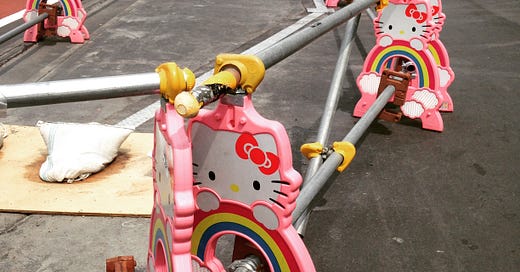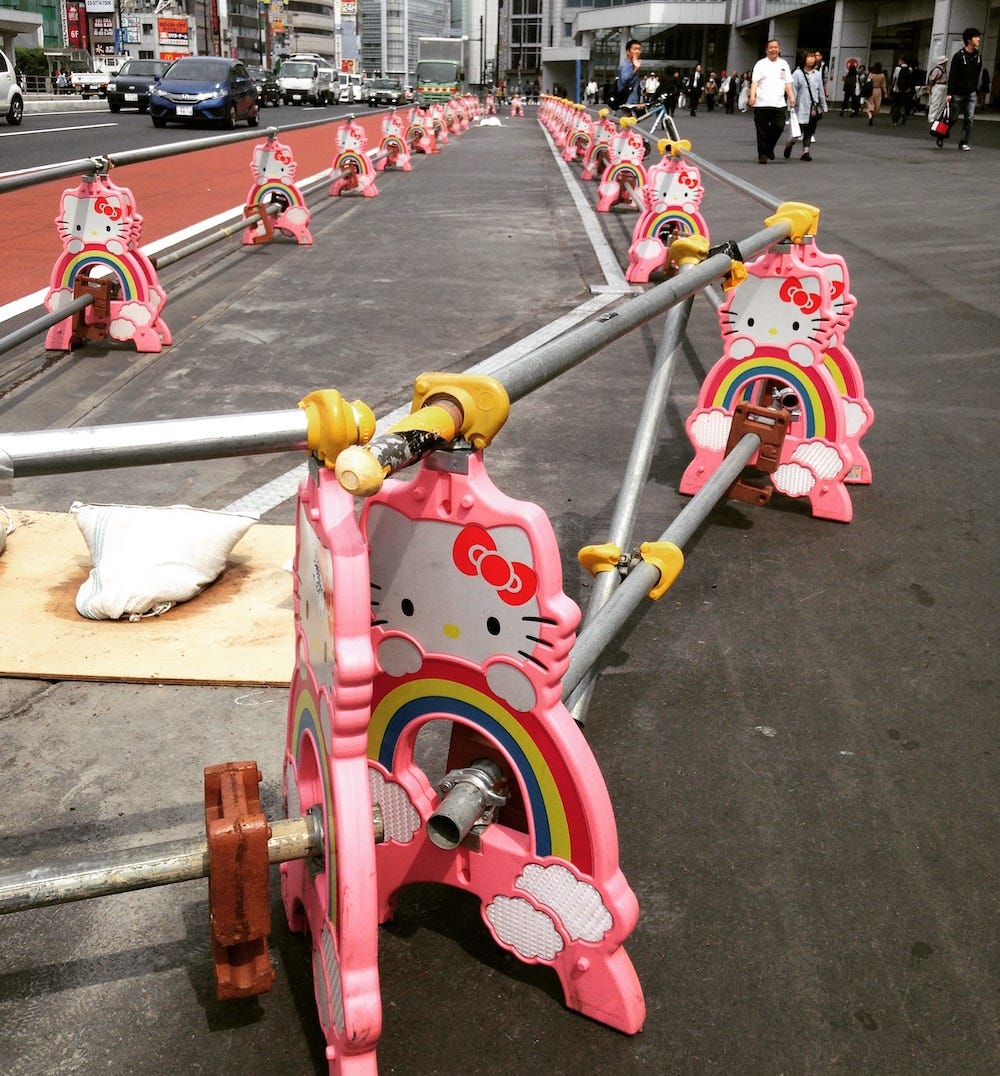I keep a cheap plastic Tokyo keychain on my car keys, which I bought in a Harajuku boutique when I went to Japan by myself for three weeks in 2016. I always think of that trip this time of year, because I somehow managed to time it so that I arrived at the peak of sakura season, when the cherry blossom trees are their most resplendent.
It was easily the best trip I’ve ever taken: a £600 return Air China flight, sleeping on tatami mat futons in sundry Airbnbs and guesthouses, delighting in the ubiquity of Hello Kitty in daily urban life, and eating almost exclusively out of konbinis and 100 yen sushi places. I pitched, reported, and wrote a feature for the Guardian while I was there about Japanese YouTuber fan culture, because that’s the kind of energy and drive I used to possess while on vacation.
I recently came across the concept of a “transitional object,” which in psychology refers to something like teddy bear or baby blanket that links a child to a physical sense of security. But it can also be an item you wear or give prominence to in your daily life that links you to an ancestor, a past chapter, or version of yourself you used to be. An inherited necklace, a framed photo on the dresser, any object that acts as a portal, bridging the gap from then to now.
As I was changing a messy diaper in the muddy parking lot of the farm shop where I buy vegetables the other day, I flung my keys on the back seat in frustration and saw the plastic keychain, the arrow that runs through the cartoonish heart now chipped off. Viewed one way, the keychain could be mocking me: How far you’ve fallen from shopping in Harajuku on an April day to this, the very antithesis of glamour and adventure!
But before I knew what a transitional object was, I had fashioned the keychain as just that. A quotidian reminder that I not only was the kind of person who traveled the world alone, who didn’t ask permission, who believed in her ideas, but that in fact I still am.
Even after a pandemic, a career pivot, a baby, and having vastly altered my expectations of what I want from the world and the future, the keychain is a portal that still feels available to me. That fearlessness, energy, and hunger for all that life has to offer is still in me. I can’t hop on planes when I find a good deal anymore — nor do I really want to, to be honest — but the writer and the mother and the person that I am is still informed by the mid-twenties person who did.
I’ve written a lot in this newsletter about the person I used to be, my “old life” pre-2020, and imagine that a lot of you, my readers, have been through similar dramatic reinventions in recent years — even if they are less public or perceptible to outsiders. However I sometimes worry that this framing implies some sort of finality, of having arrived at a place where things are now fixed in position.
I think it’s important as we age and evolve to not dunk too hard on our old selves. Because if we’re lucky, we’ll constantly be inventing new ones. If I look five, ten, fifteen years into the future, I wonder what ephemera of my daily life now might provoke the same reaction as the car keys thrown in a moment of peak dissatisfaction. What transitional object might prompt me to say: “Ah yes, her. I’m glad she did that.”
Things I enjoyed reading
“What if the austerity is how we live now — and the abundance could be what is to come?” [Washington Post]
A beautiful ode to figs, which are really “enclosed flowers that bloom modestly inward, unlike the flamboyant showoffs on other plants. ” [New Yorker]
It may not feel like it, but the “capacity to come fully alive rather than to live a half-life in survival mode, is all around us.” Great examples in here. [The Guardian]
Kindness is a business model. [Swiss Miss]
A much-loved, family-owned sandwich shop figures out whether to stay open surrounded by a thousand-person-strong homeless encampment. A uniquely modern American story. [NY Times]
I’m completely obsessed with Orna Guralnik, the therapist who stars in the documentary TV show Couples Therapy (which airs on Showtime in the US or BBC in the UK). I was delighted to find a profile of her and how the show is made. [New Yorker]
The ins and outs of medieval babycare sound … very familiar? [Aeon]
Things I enjoyed listening to
This podcast series on what the hell actually happened with JK Rowling and her public comments on trans rights is as balanced an exploration on this fraught topic as one could hope to find. [The Witch Trials of JK Rowling]
I loved this interview with Alison Roman on having a career as an aging millennial online, figuring out what kind of writer you are, and recovering from cancellation. [The Active Voice]
Catch up on Q&As
This month I published an interview with Dan Masoliver of
. It's about what growing things in the garden does for our minds, our health, and our sense of place in the world. I’m so grateful to him for sharing! If you’re new here and would like to read past Q&As in this series, I’ve created this post which keeps all the links in one place. I’ll update it regularly.These interviews are conversations with people who are forging meaningful, considered lives in this time of chaos and unpredictability. They take time and skill to produce, but I keep them available to all subscribers rather than paywalling them. If you’re interested in supporting this work so I can keep doing it, consider upgrading to a paid subscription below.
Word soup
“It’s a beautiful way to live and I want to have a beautiful life. And this is so lovely: come here, talk to artists, look at art. Go home, see my cats, paint my pictures. Go to the sea, go for a swim in the ice cold water, come back, dry myself, walk here, look at somebody’s pictures, talk to them about what they’re doing.” —Tracey Emin
Thanks for reading. If you enjoy this newsletter, it helps a surprising amount if you forward it to a friend or two, or leave a like or comment below. If you’d like to support me further, update your subscription to paid here. And if you’re already a paying subscriber, my deepest thanks for giving me the time and space to explore these themes. It means a lot.






Beautiful Rosie. Now being in the “other side” of parenting I can promise you the thrill will be there especially when you experience it with and see the same excitement through your own childrens eyes. Worth all the messy diapers in the world!
I’m right there with you in the throes of motherhood deeply longing for adventure and also finding it in my arms.